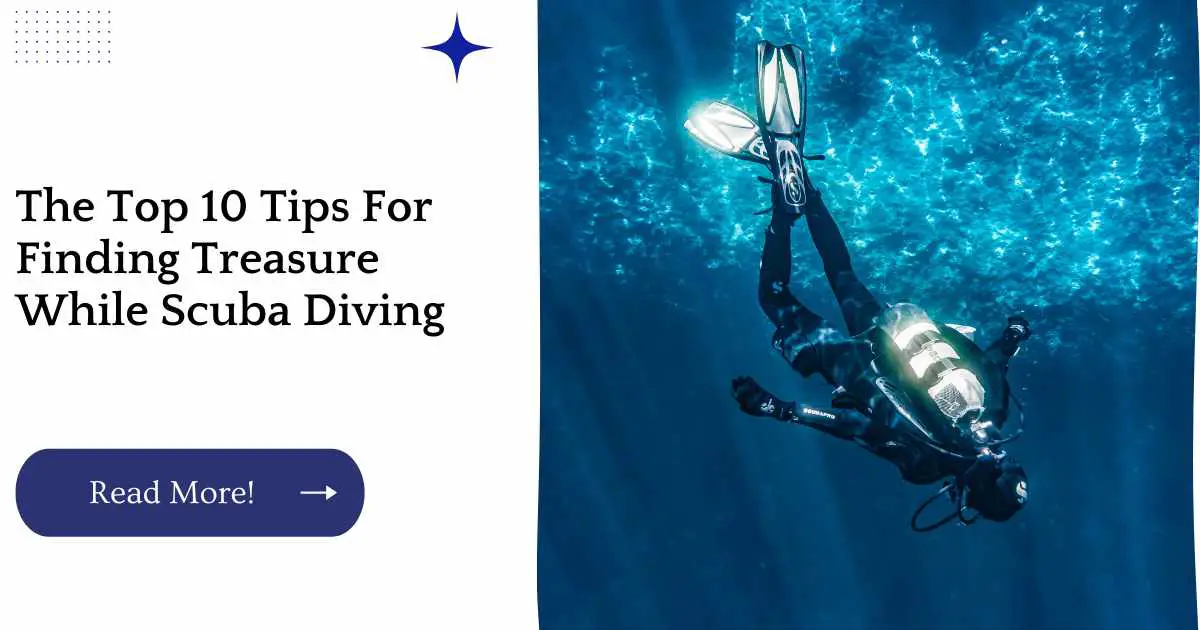Scuba diving is one of the most exciting ways to explore the ocean. You get to see things that few people ever see, and you get to experience a unique form of weightlessness that’s hard for us landlubbers to imagine.
But if you’re going scuba diving for the first time or just looking for some tips on how to find treasure while scuba diving, this guide will help you avoid common mistakes and teach you how to make your next undersea excursion more successful.
| Takeaways |
|---|
| Scuba diving is a great way to discover hidden treasures in the depths of the ocean. |
| Proper equipment and knowledge are essential for finding treasures while scuba diving. |
| Researching the area and using specialized tools like metal detectors can increase your chances of finding treasure. |
| There are many valuable treasures waiting to be discovered, from ancient artifacts to lost ships. |
| It’s important to be aware of local laws and regulations regarding keeping any treasures found while diving. |
Swimming Can Be A Lot Like Flying Fish
Swimming is a lot like flying fish. Flying fish fly because they have fins that act like wings, and swimming is like flying fish because it’s fast and fun!
So if you want to find treasure while scuba diving, why not swim? The best part about swimming is that it’s free – so go ahead and give it a try!
“Scuba diving is a thrilling adventure, but it becomes even more exciting when you find treasures hidden in the depths of the ocean. If you’re looking for the best scuba diving locations for finding treasure, check out our article on the best scuba diving locations for finding treasure.”
Swim With The Current
You might be thinking, “but shouldn’t we swim against the current? That way it will carry us away from the boat, and we’ll have more time to look for treasure!”
No. Just no. Swimming against a strong current is dangerous and can exhaust you quickly if you’re not careful and once you’re tired and out of breath, there’s no telling how long it will take to get back to shore.
In extreme cases where weather conditions are bad (and even when they aren’t), it may be impossible to swim against the tide anyway.
The key takeaway here is this: don’t swim into anything unless absolutely necessary! Whether that means swimming with or against something depends on who gets there first but either way, make sure that whatever direction you choose is one that works best for your body type after considering all factors involved in determining how fast someone moves through water based on their physical characteristics before deciding what course of action would work best under any given set of circumstances.
Look At The Sea Floor
The best way to find treasure is by looking at the sea floor. Look for signs of manmade or natural objects that are out of place, such as rocks that look like they have been moved. Look for objects that are in a straight line or in a circle, both of which could be indicators of buried treasure.
Move Slowly, But Don’t Drag Your Feet
Slow and steady wins the race. You should move slowly to avoid stirring up sediment, which can cloud your view of what’s below.
If you’re not sure how fast is too fast, imagine yourself walking through a sand dune with bare feet and try to keep pace with that speed.
If you have fins on and are moving slowly, be careful not to drag them behind you in an attempt to keep from kicking up sand too much.
The same goes for your hands or arms if they’re underwater; try not to use any kind of flailing motions as this can cause sediment in the water column above you to move around as well.
The same goes for your breathing—don’t be quick about inhaling or exhaling; breathe gently and slowly so as not to disturb anything in front of or below you while underwater
Reefs Are Just Like Minesweepers, But Underwater.
If you’re a scuba diver and your ship runs aground on the reef, it’s not exactly a good thing. But for you? It could be great!
Your job is to go underwater and survey the site of the wreck, which is covered in coral heads, some of which are still alive, some of which have been dead for a long time but haven’t fallen off yet because they’re stuck to whatever’s left of the boat.
You might find gold coins or silver bars that were stashed somewhere under there by pirates who died more than 200 years ago and didn’t want anyone else finding their treasure trove!
“Finding treasure while scuba diving requires more than just luck; you need to have the right equipment and know how to use it. Our article on how to use scuba diving equipment to find treasure provides valuable information on the tools you need and how to use them effectively.”
Find A Place You Can Always Find Again
One of the most important things to do when diving is to find a landmark you can use to always find your way back.
For example, if you are diving in Malaysia and are looking for treasure, you could use one of the giant statues as a landmark.
You could also use something like an old buoy or shipwreck; anything that would stick out in your mind so that when you come back after having searched along the ocean floor and found nothing, it will be easy for you to find again.
When searching for treasure while scuba diving, there’s nothing worse than not being able to see where your exit point is because there’s too much sand covering it up!
“If you’re a treasure hunter, scuba diving is one of the best ways to find valuable treasures hidden beneath the surface of the ocean. To learn more about the most valuable treasures ever found while scuba diving, check out our list of the top 15 most valuable treasures ever found while scuba diving. Who knows, you might just discover the next big treasure!”
Beware Of Sandbars In Currents
Sandbars are underwater sand dunes. They can be dangerous because they are hard to spot, and if you get caught in one, it’s very difficult to get out of.
If you do find yourself stuck on a sandbar, try to get back up as soon as possible so that you don’t run out of air while struggling against the current or waves.
Stay Out Of Coral Gardens And Coral Fronds
If you’re interested in seeing coral gardens and fronds, look for them on the sides of walls or rocks that are away from any major currents.
If you do find a garden or frond, try not to touch it. Divers who accidentally damage these fragile features can cause irreparable harm to the delicate ecosystem that exists within them.
“The ocean is full of mysteries and treasures waiting to be discovered. From ancient artifacts to lost ships, scuba diving has led to the discovery of some of the most fascinating treasures in history. Check out our list of the top 10 most mysterious and fascinating treasures found while scuba diving to learn more.”
Treasure Is Waiting Just Below The Surface Of The Ocean
You know that treasure is waiting just below the surface of the ocean. If you know where to look, it’s easy to find treasure. But what exactly is “treasure?”
It’s not just gold coins and jewels. Treasure can be found anywhere in the ocean, even in shallow waters.
You need only look for it with your eyes and if you have the right tools at hand, perhaps a metal detector or magnetometer as well!
“Scuba diving is a great way to explore the hidden treasures of the deep sea. Whether you’re looking for shipwrecks or ancient artifacts, there’s always something fascinating to discover. To learn more about uncovering the hidden treasures of the deep sea with scuba diving, check out our article on uncovering the hidden treasures of the deep sea with scuba diving.”
Conclusion
I hope these tips will help you find the treasure that’s been hidden under the waves for years. Good luck, and happy scuba diving!
Further Reading
Here are some additional resources on diving for treasure:
Diving Treasures: The 7 Biggest Finds: This article highlights some of the biggest and most valuable treasures ever found while scuba diving.
Diving for Treasure with Metal Detectors: Metal detectors can be an incredibly useful tool for finding treasure while scuba diving. This article provides tips and advice for using metal detectors underwater.
Underwater Treasure Hunting: This guide covers everything you need to know about underwater treasure hunting, including the equipment you’ll need and the best techniques for finding treasure.
FAQs
What kind of equipment do I need for diving for treasure?
You’ll need scuba diving gear, such as a regulator, tank, and wetsuit, as well as specialized equipment for treasure hunting, such as metal detectors and underwater scooters.
Where are the best places to go diving for treasure?
The best places to go diving for treasure depend on the type of treasure you’re looking for. Shipwrecks are often found off the coast of Florida, while ancient artifacts can be found in places like Greece and Egypt.
What are some tips for finding treasure while scuba diving?
Some tips for finding treasure while scuba diving include researching the area beforehand, using specialized equipment like metal detectors, and looking for signs of marine life that may be attracted to the treasure.
Is it legal to keep the treasures I find while diving?
The laws regarding keeping treasures found while diving vary depending on the location and type of treasure. It’s important to research local laws and regulations before attempting to keep any treasures found.
How do I know if a treasure is valuable?
The value of a treasure depends on a variety of factors, such as its historical significance, rarity, and condition. It’s important to have any treasures appraised by a professional to determine their value.

Hi there! My name is Hellen James, and I’m here to talk to you about treasure hunting. I’ve been a fan of treasure hunting ever since I was a kid, and if you’re a fan of treasure hunting or just like the idea of finding a long-lost fortune, then this blog is for you.

